
Integrating trauma awareness into early language support
Learning language in early childhood occurs through interaction between children and their caregivers. It is a foundational process that allows children to participate in social interactions, learn from the world, and develop other essential skills such as literacy. Having a language delay or disorder is associated with greater risk for experiencing trauma and vice versa. Furthermore, children’s and caregivers’ trauma histories can impact their individual strengths and needs related to participation in early language intervention.
August 25, 2025
Atypical infant movements tied to cerebral palsy may signal differences in brain connectivity
Brain connectivity differences linked to atypical infant movements may aid the early prediction of cerebral palsy development after a perinatal brain injury, a new Waisman Center study shows.
August 15, 2025
Rethinking fraction instruction: New study shows young children’s brains are wired to understand ratios – and it could change the way fractions are taught.
Even before formal schooling, children's brains can grasp ratios as holistic magnitudes—suggesting they’re naturally wired to understand foundational fraction concepts like comparing amounts.
August 8, 2025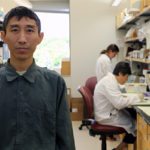
Newly funded research to study astrocyte dysfunction in Rett syndrome
The lab of Waisman Center director, Qiang Chang, PhD, professor of medical genetics and neurology, has received $1 million in funding from the Department of Defense to study the dysfunction of astrocytes, a key brain cell that supports neurons, in Rett syndrome.
April 17, 2025
Decisiones de crianza que valen la pena considerar según la ciencia del desarrollo
English Version Por Charlene N. Rivera-Bonet Este artículo es un resumen de un ensayo escrito por Seth Pollak, PhD, y Megan Gunnar, PhD, para la revista Daedelus. Puede ser difícil – y abrumador – tomar …
March 6, 2025
Caregiving decisions worth dwelling on according to developmental science
A common – and actually important – question caregivers ask is when is the right time to introduce children to a specific experience – foods, activities, languages, motor skills, germs, and more.
March 6, 2025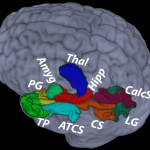
Memory impairment after severe traumatic brain injury in adolescents related to size and connectivity changes in the hippocampus and beyond.
Memory impairment as a result of a traumatic brain injury (TBI) has long been associated solely with the hippocampus, the brain’s learning and memory center. However, new research published in the journal Brain Imaging and Behavior, reveals that the hippocampus is not acting alone.
October 9, 2024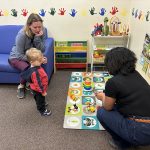
Behind the scenes of research participation at the Waisman Center: Infant Learning Lab
The lab focuses on studying how infants and young children learn language, learn the meaning of words, find patterns in language and track the properties of speech.
September 11, 2024
Childhood maltreatment leads to flattened cortisol rhythms in adolescence, a costly adaptation to an adverse environment
Adolescents who experience sustained childhood maltreatment show high, inflexible cortisol levels that persist throughout the day in different social contexts, a new study shows. This flattened cortisol rhythm may be a pathway for poorer physical and mental health in youth that experience abuse.
March 26, 2024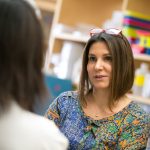
Estrogen receptor alpha mediates protection against hypoxic ischemic brain injury in newborn female mice, study shows
In her practice as a pediatric intensivist, Cengiz noticed that even with similar brain injuries, functional outcomes varied from child to child. “So, I began wondering what could be the potential mechanisms of these differences in outcome”, Cengiz says.
January 26, 2024
How physical environment shapes language learning in toddlers
The environment in which toddlers learn language may have a greater impact on word learning than previously understood.
January 24, 2024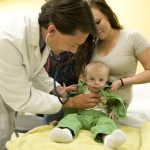
Researcher clinicians help bridge the gap between scientific discovery and medical care – Part 2
There is no one “typical” type of researcher clinician. There are differences in training, percentage of focus on research vs clinic, and type of research done. Many also carry teaching and administrative responsibilities on top of their already demanding positions.
January 10, 2024
Rebecca Alper on long-term impacts of early language skills
Early language skills are one of the best predictors of academic, social, vocational outcomes.
December 7, 2023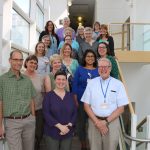
Branching out beyond where it’s planted: The story of the Waisman Center’s University Center for Excellence in Developmental Disabilities, Part 2
Former UCEDD director Bill MacLean with current director Leann DaWalt.
December 6, 2023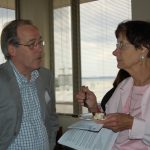
Branching out beyond where it’s planted: The story of the Waisman Center’s University Center for Excellence in Developmental Disabilities, Part 1
The University of Wisconsin-Madison was one of the first sites to be selected to have an IDDRC and UCEDD because of the urging of Harry Waisman, MD, PhD, a prominent researcher physician, for whom the Waisman Center is named.
December 5, 2023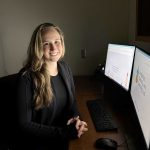
Wisconsin educators take on the surge in early speech delays
“Early language skills are one of the best predictors of academic, social, vocational outcomes,” said Rebecca Alper
November 30, 2023
New study shows non-invasive brain stimulation can be safely administered at home
A non-invasive brain stimulation technique that may improve neuroplasticity has recently been shown to be possible and safe for children with cerebral palsy when remotely instructed and conducted in a person’s home.
October 26, 2023
Artificial intelligence: A real tool for advancing research on intellectual and developmental disabilities and beyond
AI collects big data and uses computer algorithms to search patterns that are present in your daily life.
July 10, 2023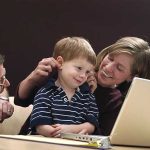
Seth Pollak: A career dedicated to understanding child emotion
The fun decals on the colorful walls and the cheerful environment gives it away, the third floor of the Waisman Center is dedicated to children. This space is where Seth Pollak, PhD, has spent most of his career studying child emotion, and how early life experiences shape the brain during development.
June 7, 2023
The Little Listeners Project: studying language development in toddlers with autism
Even through cute but unintelligible babbles, infants are hard at work learning how to become successful communicators.
May 31, 2023- More Infant and Childhood Development posts
Advancing knowledge of human development, developmental disabilities, and neurodegenerative diseases.
